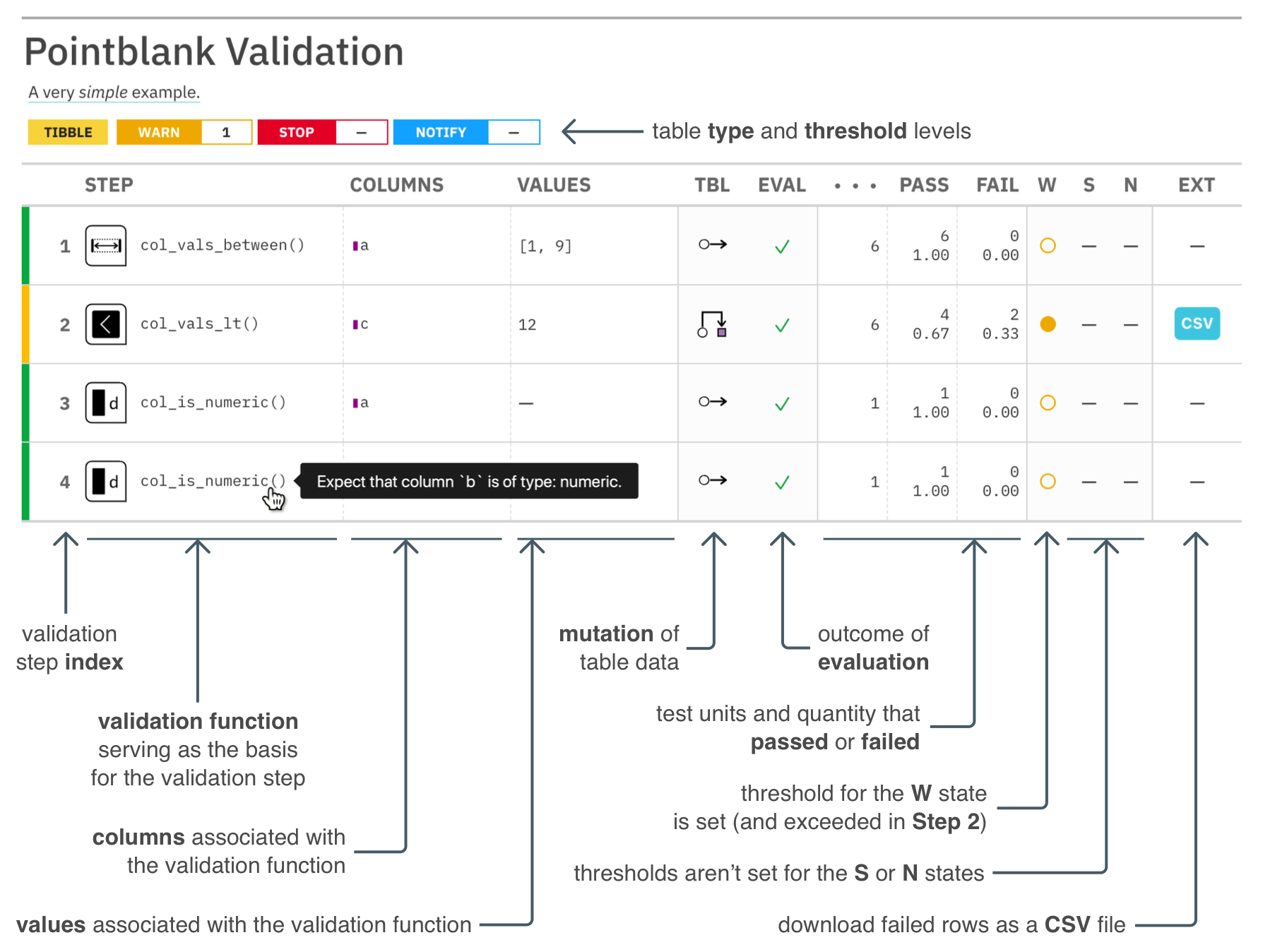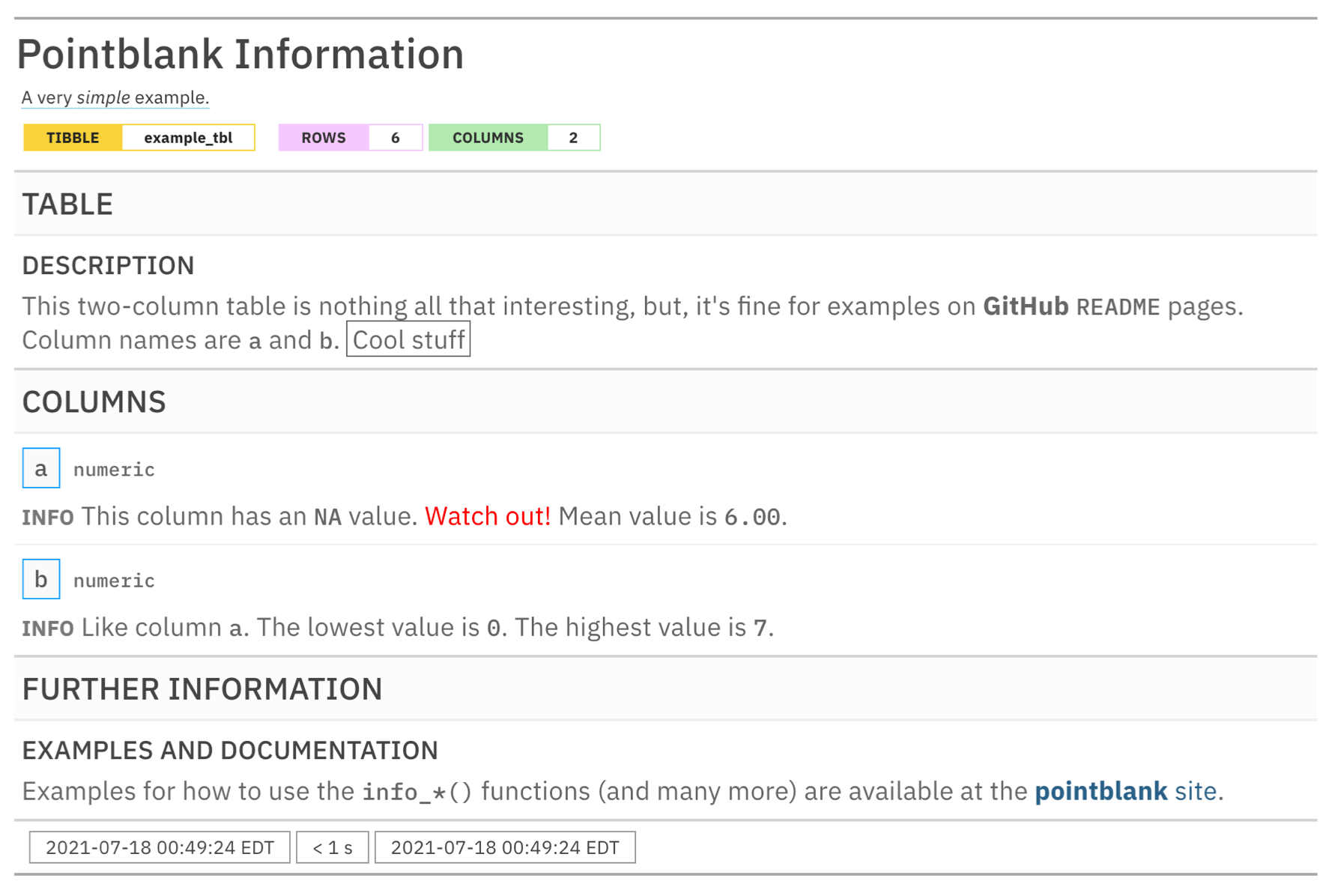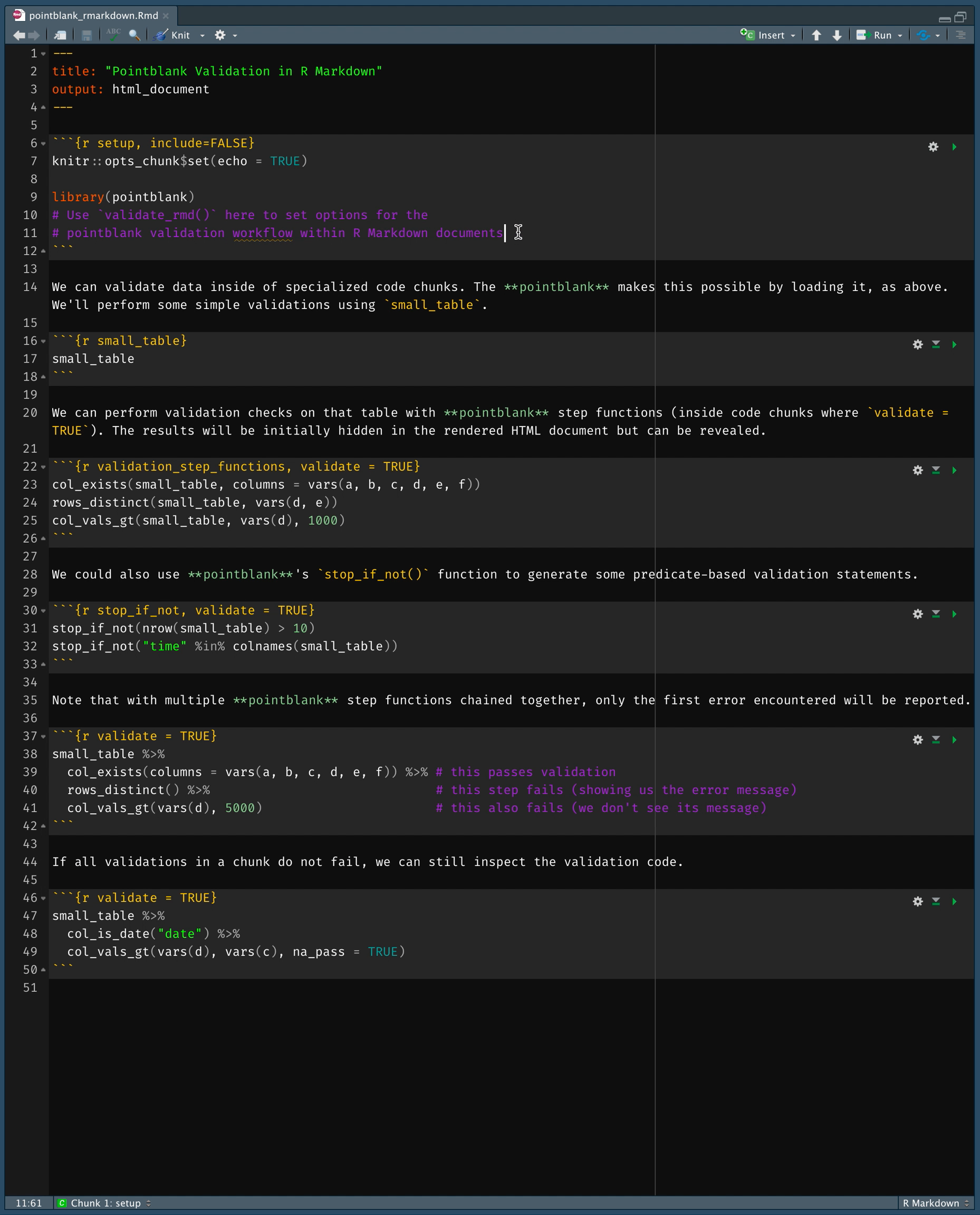rich-iannone / Pointblank
Programming Languages
Projects that are alternatives of or similar to Pointblank
With the pointblank package it’s really easy to methodically validate your data whether in the form of data frames or as database tables. On top of the validation toolset, the package gives you the means to provide and keep up-to-date with the information that defines your tables.
For table validation, the agent object works with a large collection of
simple (yet powerful!) validation functions. We can enable much more
sophisticated validation checks by using custom expressions and also through
stepwise mutation of the target table (through something we call
preconditions).
Sometimes we want to maintain table information and update it when the table goes through changes. For that, we can use an informant object + associated functions to help define the metadata entries and present it in a way that suits you.
TABLE VALIDATIONS WITH AN AGENT AND DATA QUALITY REPORTING
Data validation can be carried out in Data Quality Reporting workflow, ultimately resulting in the production of of a data quality analysis report. This is most useful in a non-interactive mode where data quality for database tables and on-disk data files must be periodically checked. The pointblank agent is given a collection of validation functions to define validation steps. We can get extracts of data rows that failed validation, set up custom functions that are invoked by exceeding set threshold failure rates, etc. Want to email the report regularly (or, only if certain conditions are met)? Yep, you can do all that.
Here is an example of how to use pointblank to validate a local table with an agent.
# Generate a simple `action_levels` object to
# set the `warn` state if a validation step
# has a single 'fail' test unit
al <- action_levels(warn_at = 1)
# Create a pointblank `agent` object, with the
# tibble as the target table. Use three validation
# functions, then, `interrogate()`. The agent will
# then have some useful intel.
agent <-
dplyr::tibble(
a = c(5, 7, 6, 5, NA, 7),
b = c(6, 1, 0, 6, 0, 7)
) %>%
create_agent(
label = "A very *simple* example.",
actions = al
) %>%
col_vals_between(
vars(a), 1, 9,
na_pass = TRUE
) %>%
col_vals_lt(
vars(c), 12,
preconditions = ~ . %>% dplyr::mutate(c = a + b)
) %>%
col_is_numeric(vars(a, b)) %>%
interrogate()
The reporting’s pretty sweet. We can get a gt-based report by printing an agent.

The pointblank package is designed to be both straightforward yet powerful. And fast! Local data frames don’t take very long to validate extensively and all validation checks on remote tables are done entirely in-database. So we can add dozens or even hundreds of validation steps without any long waits for reporting.
Should you want to perform validation checks on database or Spark
tables, provide a tbl_dbi or tbl_spark object to create_agent().
The pointblank package currently supports PostgreSQL. MySQL,
MariaDB, DuckDB, SQLite, and Spark DataFrames (through the
sparklyr package). The db_tbl() function is provided by
pointblank to make accessing a DB table insanely easy.
Here are some validation reports for the considerably larger
intendo::intendo_revenue table.
VALIDATIONS DIRECTLY ON DATA
The Pipeline Data Validation workflow uses the same collection of validation functions but without need of an agent. This is useful for an ETL process where we want to periodically check data and trigger warnings, raise errors, or write out logs when exceeding specified failure thresholds. It’s a cinch to perform checks on import of the data and at key points during the transformation process, perhaps stopping data flow if things are unacceptable with regard to data quality.
The following example uses the same three validation functions as before but, this time, we use them directly on the data. The validation functions act as a filter, passing data through unless execution is stopped by failing validations beyond the set threshold. In this workflow, by default, an error will occur if there is a single ‘fail’ test unit in any validation step:
dplyr::tibble(
a = c(5, 7, 6, 5, NA, 7),
b = c(6, 1, 0, 6, 0, 7)
) %>%
col_vals_between(
vars(a), 1, 9,
na_pass = TRUE
) %>%
col_vals_lt(
vars(c), 12,
preconditions = ~ . %>% dplyr::mutate(c = a + b)
) %>%
col_is_numeric(vars(a, b))
Error: Exceedance of failed test units where values in `c` should have been < `12`.
The `col_vals_lt()` validation failed beyond the absolute threshold level (1).
* failure level (2) >= failure threshold (1)
We can downgrade this error to a warning with the warn_on_fail() helper
function (assigning it to actions). In this way, the data will always be
returned, but warnings will appear.
# The `warn_on_fail()` function is a nice
# shortcut for `action_levels(warn_at = 1)`;
# it works great in this data checking workflow
# (and the threshold can still be adjusted)
dplyr::tibble(
a = c(5, 7, 6, 5, NA, 7),
b = c(6, 1, 0, 6, 0, 7)
) %>%
col_vals_between(
vars(a), 1, 9,
na_pass = TRUE,
actions = warn_on_fail()
) %>%
col_vals_lt(
vars(c), 12,
preconditions = ~ . %>% dplyr::mutate(c = a + b),
actions = warn_on_fail()
) %>%
col_is_numeric(
vars(a, b),
actions = warn_on_fail()
)
#> # A tibble: 6 x 2
#> a b
#> <dbl> <dbl>
#> 1 5 6
#> 2 7 1
#> 3 6 0
#> 4 5 6
#> 5 NA 0
#> 6 7 7
Warning message:
Exceedance of failed test units where values in `c` should have been < `12`.
The `col_vals_lt()` validation failed beyond the absolute threshold level (1).
* failure level (2) >= failure threshold (1)
Should you need more fine-grained thresholds and resultant actions, the
action_levels() function can be used to specify multiple failure
thresholds and side effects for each failure state. However, with
warn_on_fail() and stop_on_fail() (applied by default, with
stop_at = 1), you should have good enough options for this validation
workflow.
VALIDATIONS IN R MARKDOWN DOCUMENTS
Using pointblank in an R Markdown workflow is enabled by default
once the pointblank library is loaded. The framework allows for
validation testing within specialized validation code chunks where the
validate = TRUE option is set. Using pointblank validation
functions on data in these marked code chunks will flag overall failure
if the stop threshold is exceeded anywhere. All errors are reported in
the validation code chunk after rendering the document to HTML, where
green or red status buttons indicate whether all validations succeeded
or failures occurred. Click them to reveal the otherwise hidden
validation statements and any associated error messages.
The above R Markdown document is available as a template in the RStudio
IDE (it’s called Pointblank Validation). Try it out!
TABLE INFORMATION
Table information can be synthesized in an information management workflow, giving us a snapshot of a data table we care to collect information on. The pointblank informant is fed a series of information functions to define bits of information about a table. This info text can pertain to individual columns, the table as a whole, and whatever additional information makes sense for your organization. We can even glean little snippets of information from the target table and mix them into the info text at will.
Here is an example of how to use pointblank to incorporate pieces of info text into an informant object.
# Create a pointblank `informant` object, with the
# tibble as the target table. Use a few information
# functions and end with `incorporate()`. The informant
# will then show you information about the tibble.
informant <-
dplyr::tibble(
a = c(5, 7, 6, 5, NA, 7),
b = c(6, 1, 0, 6, 0, 7)
) %>%
create_informant(
label = "A very *simple* example.",
tbl_name = "example_tbl"
) %>%
info_tabular(
description = "This two-column table is nothing all that
interesting, but, it's fine for examples on **GitHub**
`README` pages. Column names are `a` and `b`. ((Cool stuff))"
) %>%
info_columns(
columns = "a",
info = "This column has an `NA` value. [[Watch out!]]<<color: red;>>"
) %>%
info_columns(
columns = "a",
info = "Mean value is `{a_mean}`."
) %>%
info_columns(
columns = "b",
info = "Like column `a`. The lowest value is `{b_lowest}`."
) %>%
info_columns(
columns = "b",
info = "The highest value is `{b_highest}`."
) %>%
info_snippet(
snippet_name = "a_mean",
fn = ~ . %>% .$a %>% mean(na.rm = TRUE) %>% round(2)
) %>%
info_snippet(snippet_name = "b_lowest", fn = snip_lowest("b")) %>%
info_snippet(snippet_name = "b_highest", fn = snip_highest("b")) %>%
info_section(
section_name = "further information",
`examples and documentation` = "Examples for how to use the
`info_*()` functions (and many more) are available at the
[**pointblank** site](https://rich-iannone.github.io/pointblank/)."
) %>%
incorporate()
By printing the informant we get the table information report.

Here is an information report for the intendo::intendo_revenue table.
TABLE SCANS
While data validation is important, one has to be familiar with the data
first. To that end, the scan_data() function is provided in
pointblank for generating a comprehensive summary of a tabular
dataset. The report content is customizable, can be used inside an R
Markdown document, and (as with the validation report) it can be
produced in eight different languages: English, French, German,
Italian, Spanish, Portuguese, Chinese (China mainland), and
Russian. Here are several published examples of a Table Scan for
each of these languages using the dplyr::storms dataset. Clicking any
of these will take you to a highly interactive RPubs document.
Database tables can be used with scan_data() as well. Here are two
examples using the full_region table of the Rfam database (hosted
publicly at mysql-rfam-public.ebi.ac.uk) and the assembly table of
the Ensembl database (hosted publicly at ensembldb.ensembl.org).
OVERVIEW OF PACKAGE FUNCTIONS
There are many functions available in pointblank for making
comprehensive table validations. Each validation function is associated
with an expectation function (of the form expect_*()). They are
equivalent in usage and behavior to testthat tests with the big
distinction that they check aspects of data tables (and not the results
of function calls). Furthermore, each validation function has an
associated test function (of the form test_*()) which always returns a
logical value (TRUE or FALSE).
DISCUSSIONS
Let's talk about data validation and data documentation in pointblank Discussions! It's a great place to ask questions about how to use the package, discuss some ideas, engage with others, and much more!
INSTALLATION
Want to try this out? The pointblank package is available on CRAN:
install.packages("pointblank")
You can also install the development version of pointblank from GitHub:
devtools::install_github("rich-iannone/pointblank")
If you encounter a bug, have usage questions, or want to share ideas to make this package better, feel free to file an issue.
How pointblank Fits in with Other Packages that Validate Tabular Data
The pointblank package isn’t the only one of its kind available for R. The reason for introducing yet another has to do with pointblank’s goals:
- ability to work with local tables, database tables, and Spark DataFrames (via sparklyr) with minimal changes in the API
- great flexibility in data validation workflows, allowing for: (1)
report-based validations, (2) inline validations, (3) validation of
data tables in unit tests (with the set of
expect_*()functions), and (4) validation of data tables to support conditional expressions (with the set oftest_*()functions) - enabling a workflow for collecting and reporting on useful information about your data tables
- extra tools for understanding new datasets (
scan_data()) and validating data in specialized R Markdown code chunks (validate_rmd()) - reporting outputs translated to multiple spoken languages
- developing an API that closely follows tidyverse conventions by adhering to the tidyverse style guide
- lots of attention on making the package documentation and examples the best they can be
While pointblank is trying to do something different, it may not suit your specific needs. Here is a listing of some other validation R packages:
validate (GITHUB)
dataMaid (GITHUB)
Code of Conduct
Please note that the pointblank project is released with a contributor
code of
conduct.
By
participating in this project you agree to abide by its terms.
📄 License
pointblank is licensed under the MIT license.
See the LICENSE.md file for more details.
🏛️ Governance
This project is primarily maintained by Rich Iannone. Other authors may occasionally assist with some of these duties.

















